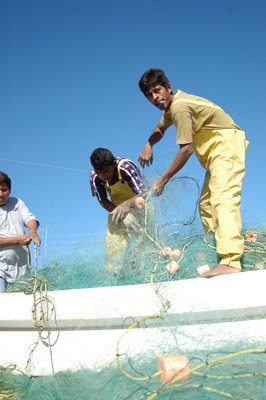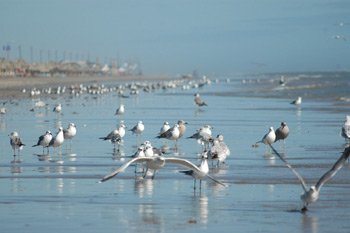


México Bravo? Barbarous River?
In Matamoros with the Zapatista Other Campaign
By Rodrigo Ibarra
The Trojan Rocinante, Column #3
December 3, 2006
A landscape like a blank page. Between Matamoros and the Rio Bravo delta (known as the Rio Grande north of the border) there seems to be no more than a desert of brown shrubs, lost in the smoky mist of the horizon, held up by the sun. The passengers of the Trojan Rocinante, as I have christened our bus, began to doze off to the humming of the motor as we drove down the long and monotonous highway. Suddenly, like a mirage amid the desolation, a great funeral procession paraded past us in the opposite direction: Hummers, Porches, Chayannes, Lobos, Suburbans. A hundred four-by-fours with wide tires and tinted glass, quite ostentatious.
Barbarous Mexico
 Photos: D.R. 2006 Rodrigo Ibarra |
The current paradox of the announcement of our supposed achievement of democracy is even more ridiculous and outrageous. Today’s slavery in Mexico is even more absurd than that of a century ago. Get your feet wet at Playa Bagdad, on the northeast edge of the imposed border, on the banks of the putrid and muddy Rio Bravo delta.
The Horse Goes for a Stroll
Around four in the afternoon the doors to the wooden huts of Playa Bagdad open up. All of them, as well as every one of the hundreds of poor family shacks, belong to Alejandro and Alicia Gómez Barrios. (How many bosses loans a house to each of their workers?) The fishermen load their nets, tools and drums of gasoline onto their 50-or-so boats. The Horse strolls down the beach.
The boats, the nets, the tools and equipment are all, each and every item, property of Alejandro and Alicia. But not the gasoline. The fishermen have to buy that. (How many bosses loan boats, nets and tools to each of their workers?) The fishermen put off to sea. They cast their nets and drag them back in. They pull out the fish that get caught in them. Dogfish, snapper, scale fish. They cast out again. The nets sink with the weight of the prayers and hope of catching more kilos of fish than the litres of gasoline consumed in the trip out to sea. Many times, that doesn’t happen. They cast and pull in the nets again. And again. The return in the wee hours of the morning. The fish is brought to the warehouse and weighed. The weight and quality of the product is registered in the boss’s notebook. The Horse strolls by the warehouse.
It is pitch black when the fisherman returns home. For years there have been nothing but empty lampposts in the town. There has never been electricity in the houses. Neither is there a school, or a hospital, or a church. Through the town, in the pitch black, strolls the Horse.
 |
The children head to the store. There is more than one store in Playa Bagdad. But only one will sell them eggs (one peso each), sugar (20 pesos a kilo) and oil (eight pesos for half a litre) in exchange for a vale – an I-owe-you slip. The fishermen just scratch by week-to-week, so the choice of what store to go to is a simple one: the big store, Doña Alicia’s store. (How many bosses put up a store for their workers and sell them food on credit?)
Each week, the day comes to settle accounts. Fish sells for 5 to 10 pesos (45–90 cents) per kilo. Red snapper brings in 20 to 30 pesos. They total everything up. Then they begin subtracting.
“You owed 3,500 last week, plus nine-hundred-something this week. We’ll just say 1000, ok? So here you have 500 pesos to spend.”
“Give me a little more boss, even just 900 to get me through the week. You know I can’t make it with 500.”
“Ah, my little cabrón. Take it but don’t be charging anything else to the account.”
Just outside, the Horse strolls by.
Life is Worthless
A few months ago, Juan García Guerrero drowned at sea, fishing, after five years of working for his boss Alejandro Gómez. He left two girls, 9 and 8, and one boy, 3 years old. “When my son-in-law drowned, the boss said, ‘now another one can die.’ He made it very clear to us that his equipment (the boat, the nets, the tools) was worth much more to him than the dead man.” The boss paid for the coffin and the funeral, around 8,000 pesos ($730). The equipment is worth around 20,000 pesos. His widow asked for compensation for their children. The dead man owed around 3,000 pesos in the store. Once he had been set in the coffin, they invented a debt of more than 20,000 in the store, plus 60 pesos for the soda he had bought on his last day at sea. The widow would not give in, and began talking to a lawyer to demand her right to some compensation. The boss paid her by exiling her from Playa Bagdad. That day, Gómez Barrios’ men threw all the families belongings out of the house – which, at the end of the day, is the boss’s property – and into the sandy street. The children now live with their grandmother. “Their mother, mi daughter, comes every eight days. She earns very little, working in a restaurant. She sends things and money for her kids, but it’s not enough.” There is no social security, no welfare. People tell them they have it, but no one is assuring it.
Fear of Horses
 |
“And why don’t you report this to the police?”
“He is a god. They keep us down. They have the police, the federales, and the Navy in their pocket. They’ve even got a foot over the boss’ head.”
Justice is swift in Playa Bagdad. The Horse applies a hard hand, hard as a board.
Chains of Salt
As the landowners of the previous century would tell Kenneth Turner, Alejandro Gómez Parrios would surly disagree with my characterization here of his labor relations with the fishermen. “No one is forced to be here,” he tells the compañeros. “Whoever doesn’t want to be here, fuck his mother.” What slavery? Where are the shackles, the chains? Neither walls nor barbed-wire fences circle Playa Bagdad. The open and unreachable horizon is reveals its desolation: the sea to the east and the desert to the west. There are no shackles fixed to arms. There is a rope to hold onto and an abyss below. The abyss of rootlessness, of abandoning everything, of forgetting all but the what is of today: family, friends, the house and the fishing nets even though they are borrowed; the sea and the golden dawn, that daily metaphor of hope. The fishermen of Playa Bagdad own nothing. The nets, their livelihood, are borrowed. They are born and they die casting that net. With every stroke of the oar, the ocean falls from between their fingers.
Epilog
The news on the Other Campaign caravan is that the line of vehicles from all the law enforcement agencies, from the “intelligence” and military groups that have followed us across the entire country, have been joined by several trucks like the ones in the funeral procession with which I began this story. Vehicles without plates, with tinted glass and Santa Muerte stickers on the rear window. Heavy gold jewelry hangs out the windows.
Ah, and about that funeral. It was a “junior” who died. The son of a drug capo. He had flipped his new Cherokee on the highway. For three days, he was in a coma, and he died a day before the Other Campaign’s arrival. He passed by us, dead, going the opposite direction with a trail of mafiosos heading toward the cemetery.
Originally published in Spanish November 27
Click here for more Narco News coverage of Mexico
Lea Ud. el Artículo en Español
Lisez cet article en français
Lees dit artikel in het Nederlands
- The Fund for Authentic Journalism
For more Narco News, click here.




